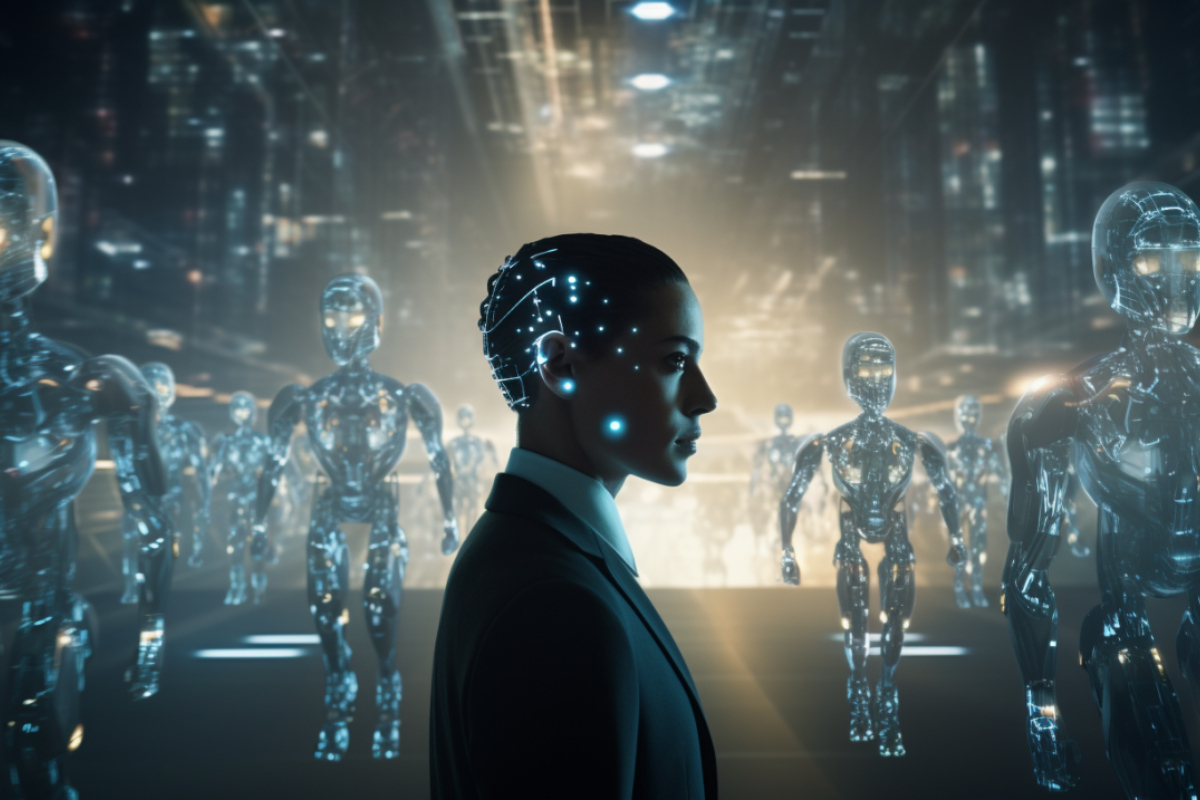AI Unleashed: How Artificial Intelligence is Reshaping Our World

Strong 8k brings an ultra-HD IPTV experience to your living room and your pocket.
Artificial Intelligence (AI) is no longer a distant concept; it’s a present-day reality that is rapidly transforming our world. Whether it’s automating mundane tasks, revolutionizing industries, or redefining how we interact with technology, AI is at the forefront of innovation. From business to healthcare, entertainment to education, AI’s reach is vast, and its potential for further evolution seems limitless. This article explores how AI is reshaping our world across various sectors and the impact it’s having on society.
1. AI in Business: Revolutionizing Efficiency and Strategy
In the business world, AI is an indispensable tool, driving efficiency, innovation, and decision-making. Companies across industries are leveraging AI to streamline operations, reduce costs, and provide personalized customer experiences.
Automation and Efficiency
AI-powered automation allows businesses to handle repetitive, time-consuming tasks more efficiently. From processing invoices to managing supply chains, AI systems can handle vast amounts of data quickly and with greater accuracy than human workers. This enables businesses to reduce human error and enhance productivity. Robotic Process Automation (RPA) is a perfect example, as it uses AI to automate routine tasks like data entry and processing, freeing up human employees to focus on higher-value tasks.
Predictive Analytics
AI excels in predictive analytics, allowing businesses to anticipate trends, forecast demand, and make informed decisions. Machine learning algorithms analyze historical data to make accurate predictions about consumer behavior, market trends, and sales forecasts. Retailers, for instance, can use AI to predict which products will be in demand and optimize their inventory accordingly, minimizing waste and maximizing profit.
AI in Customer Service
The rise of AI-powered chatbots has revolutionized customer service. These virtual assistants can handle inquiries, resolve issues, and even process transactions 24/7. AI-driven chatbots can learn from customer interactions to improve responses over time, creating a seamless customer experience. This has become increasingly common in industries like retail, banking, and telecommunications.
AI in Marketing
Personalization is the key to modern marketing, and AI plays a pivotal role in creating tailored customer experiences. AI analyzes customer data, including browsing behavior, preferences, and purchase history, to deliver personalized content, product recommendations, and advertisements. This kind of hyper-targeted marketing enhances customer engagement and drives higher conversion rates.
2. AI in Healthcare: Enhancing Diagnosis and Treatment
Source: AmyGB
AI’s impact on healthcare has been profound, offering promising solutions for better diagnosis, treatment, and patient care.
AI in Diagnostics
AI-powered diagnostic tools are revolutionizing the way diseases are detected and treated. Machine learning algorithms can analyze medical images, such as X-rays, MRIs, and CT scans, with incredible accuracy. These AI systems can identify anomalies that may be missed by the human eye, leading to early detection of diseases like cancer, heart disease, and neurological disorders.
For example, AI tools like IBM Watson Health are being used to analyze patient data and recommend personalized treatment plans. This type of precision medicine enhances the accuracy of diagnoses and ensures patients receive the most effective treatments based on their unique genetic makeup and health history.
Drug Discovery
The process of developing new drugs is traditionally lengthy and costly. AI is changing that by speeding up drug discovery through simulations and pattern recognition. AI models can analyze massive datasets of chemical compounds, predicting which molecules are most likely to succeed as potential drugs. This drastically shortens the time frame for new medications to reach the market, allowing for faster responses to health crises such as pandemics.
AI in Surgery
AI is also playing a role in surgical procedures, particularly through robotic-assisted surgeries. Robots, powered by AI, are capable of performing precise operations with minimal invasiveness, reducing the risk of complications and speeding up recovery times for patients. Surgeons can control these robots with high precision, combining human expertise with AI-driven accuracy.
3. AI in Education: Personalized Learning at Scale
AI is reshaping the education landscape by enabling personalized learning experiences that cater to individual student needs.
Adaptive Learning
AI-powered platforms can assess a student’s strengths, weaknesses, learning style, and pace, offering customized learning paths. This is particularly valuable in online education, where AI can provide instant feedback, adjust content difficulty, and suggest additional resources to help students grasp complex concepts. Adaptive learning platforms like DreamBox and Smart Sparrow are already making education more personalized and efficient.
AI Tutoring
Virtual tutors are another innovation powered by AI, offering students assistance outside traditional classroom settings. These AI tutors can provide instant answers to questions, clarify misunderstandings, and offer additional explanations. This ensures that students get timely support, which is especially helpful in distance learning or self-paced courses.
AI for Administrative Tasks
Beyond the classroom, AI is streamlining administrative tasks in educational institutions. AI systems can automate student admissions, track performance, and even manage financial aid processes, freeing up staff to focus on more complex and human-centered activities.
4. AI in Entertainment: Transforming Content Creation and Consumption
Source:Miquido
The entertainment industry is embracing AI to enhance both content creation and consumption experiences.
AI in Content Creation
From music to film and video games, AI is being used to create new forms of content. AI-driven algorithms can compose music, write scripts, and even generate 3D models for animation. For example, AI-generated music tools like AIVA (Artificial Intelligence Virtual Artist) can compose original soundtracks, while OpenAI’s GPT models can be used to generate storylines or dialogues for films and TV shows.
Personalized Recommendations
AI is integral to recommendation systems on platforms like Netflix, Spotify, and YouTube. These platforms use AI algorithms to analyze user preferences and recommend content that aligns with individual tastes. This personalization enhances user experience, ensuring that consumers are presented with content they are more likely to enjoy, thereby increasing engagement.
AI in Gaming
In the gaming industry, AI is transforming how games are developed and played. AI algorithms are used to create smarter, more adaptive non-player characters (NPCs) that can react to player actions in real time, creating more immersive gaming experiences. Moreover, AI is being employed to enhance graphics, design more complex environments, and even assist with game testing by identifying bugs and optimizing gameplay.
5. AI in Transportation: Driving the Future of Mobility
AI is set to revolutionize transportation through autonomous vehicles, smart traffic systems, and optimized logistics.
Autonomous Vehicles
Self-driving cars, powered by AI, are one of the most anticipated technological advancements in the transportation sector. AI systems in autonomous vehicles use sensors, cameras, and machine learning algorithms to navigate roads, avoid obstacles, and make real-time decisions. Companies like Tesla, Waymo, and Uber are pioneering this technology, with the goal of reducing traffic accidents and improving road safety.
Smart Traffic Systems
AI is also being employed in smart traffic management systems. These systems use real-time data from cameras and sensors to monitor traffic flow and optimize signal timings. AI can analyze traffic patterns and predict congestion, enabling authorities to implement dynamic traffic controls that minimize delays and reduce emissions.
AI in Logistics
In the logistics industry, AI is improving supply chain efficiency through route optimization, predictive maintenance, and warehouse automation. AI algorithms can predict the most efficient delivery routes, reducing fuel consumption and delivery times. In warehouses, AI-powered robots are automating the sorting, packing, and shipping of goods, leading to faster and more cost-effective operations.
6. AI and Ethics: The Importance of Responsible AI Development
Source: Brookings Institution
While AI offers countless benefits, it also raises significant ethical concerns that must be addressed.
Bias in AI Systems
AI systems are only as good as the data they are trained on, and if that data is biased, the AI’s decisions will be biased too. This can have serious consequences, particularly in areas like hiring, law enforcement, and credit scoring. Ensuring that AI systems are trained on diverse, representative datasets is crucial to avoid perpetuating discrimination.
AI and Job Displacement
As AI continues to automate jobs, concerns about job displacement have grown. While AI will create new roles, there’s no denying that some jobs will become obsolete. Governments and businesses must invest in reskilling and upskilling programs to ensure that workers are prepared for the changing job landscape.
Data Privacy
AI systems often rely on vast amounts of personal data to function effectively, raising concerns about privacy. It is essential for governments and organizations to implement robust data protection regulations to ensure that AI systems are used responsibly and do not infringe on individual privacy rights.
Conclusion
Artificial Intelligence is reshaping our world in unprecedented ways. From business and healthcare to entertainment and transportation, AI is driving innovation and transforming industries. However, with great power comes great responsibility, and it is critical to develop and implement AI in a way that maximizes its benefits while minimizing its risks. As AI continues to evolve, its potential to improve our lives is vast, but we must remain vigilant in addressing the ethical challenges that come with it.
Uncover the latest trends and insights with our articles on Visionary Vogues
Note: IndiBlogHub features both user-submitted and editorial content. We do not verify third-party contributions. Read our Disclaimer and Privacy Policyfor details.


